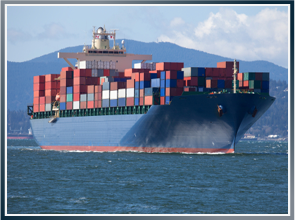Are Overweight Shipping Containers Safe?
 When cargo is loaded onto a container ship, someone on board is charged with figuring out where each container should be placed on the vessel. Cargo placed on container ships presents a particular problem because each container looks similar, so the person in charge of placement must make decisions based on the documented weight of each container. However, the problem is that the “declared weight” listed on each container manifest is often simply an estimate or completely wrong. As a result, container ship accidents occur, including containers falling overboard, severe listing or even capsizing, all of which can cause serious harm to workers on board.
When cargo is loaded onto a container ship, someone on board is charged with figuring out where each container should be placed on the vessel. Cargo placed on container ships presents a particular problem because each container looks similar, so the person in charge of placement must make decisions based on the documented weight of each container. However, the problem is that the “declared weight” listed on each container manifest is often simply an estimate or completely wrong. As a result, container ship accidents occur, including containers falling overboard, severe listing or even capsizing, all of which can cause serious harm to workers on board.
In 2010, the U.S. International Maritime Organization began looking at the issue of overweight containers and improper loading of containers onto vessels. After several years of study and several incidents that involved the capsizing of large container ships, the organization recommended that shippers be required to confirm the “verified gross mass” (VGM) of containers on their ships. The Safety of Life at Sea (SOLAS) reviewed the findings and beginning July 1st, the requirements are going into effect for all container ships.
Will This New VGM Requirement Prevent Container Ship Accidents?
Requiring shippers to verify the VGM weight for each container will help avoid overloading container ships and decrease the likelihood of listing, capsizing or any other container ship accidents caused by overloading, as shippers will now be able to have a precise estimate to compare to the maximum weight allowed on the ship. However, many in the shipping industry are racking their brains as to how to implement this new regulation. They turned to the Coast Guard for a standardized process to settle the dispute and make widespread implementation easier. As it turns out, the shipping industry is on its own.
Last month, the Coast Guard released a statement saying it will not seek new regulations for U.S. shippers on an international requirement. The statement went on to say shippers, carriers and any other maritime associations have many accessible methods, resources and best practices available to them and do not need the federal government to get involved. Well, we’re all for this new safety regulation, but perhaps the Coast Guard could help those in the shipping industry transition into this new regulation to ensure fewer incidents occur within the next few months.
Latti Associates LLC is a maritime injury law firm that fights for those who have been injured at sea.
Source: http://www.wsj.com/articles/coast-guard-no-new-container-weight-rules-coming-1461953237